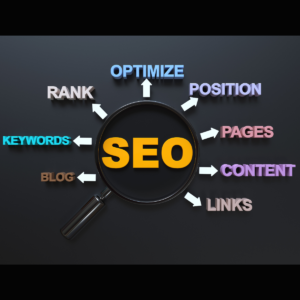
The Ultimate Solution for Busy Entrepreneurs

Struggling to manage your website while running your business? We've got you covered with a completely hands-off small business website for just $99 a month!
Ready to take the next step? Click here to schedule your 30-minute consultation and make your business life easier than ever.
So you’ve set up your online store and now you’re ready to get more traffic and sales. That’s where ecommerce SEO comes in. Ecommerce SEO is all about optimizing your online store so that it ranks higher in search engine results and attracts more organic traffic. With effective SEO strategies and techniques, you can increase your visibility online, outrank your competitors, and drive more qualified leads to your website. In this article, we’ll explore the importance of ecommerce SEO and provide you with practical tips and tricks to help you improve your search engine rankings and boost your online sales.
What is Ecommerce SEO?
Ecommerce SEO, also known as ecommerce search engine optimization, refers to the practice of optimizing an ecommerce website to improve its visibility and organic search rankings. The goal is to attract more relevant traffic from search engines, such as Google, and increase the chances of converting visitors into customers.
Definition of Ecommerce SEO
Ecommerce SEO involves various strategies and techniques that focus on improving the visibility of an online store in search engine results pages (SERPs). It includes optimizing both on-page and off-page elements to ensure that the website ranks higher in search results when users search for relevant keywords or phrases related to the products or services being offered.
Transform Your Business, Transform Your Life

Why Choose Host SMB Limited?
World-Class Design Meets Functionality
We don't just build websites; we create experiences. Our team of seasoned professionals designs custom, responsive websites optimized for both mobile and desktop. Your small business is unique; your website should be too. We have packages starting at $99 a month for all of your website needs taken care of.SEO Ready and Built for Growth
A beautiful website is just a start. We lay the foundation for your online success by implementing proven SEO strategies that make your site easily discoverable.Importance of Ecommerce SEO
In the highly competitive world of ecommerce, having a well-optimized website is crucial to stand out from the competition and attract potential customers. Here are some reasons why ecommerce SEO is important:
-
Increased organic traffic: By implementing effective SEO strategies, you can improve your website’s visibility in search results, leading to an increase in organic traffic. This means more potential customers discovering your products and services without the need for paid advertising.
-
Higher conversion rates: When your website is optimized for relevant keywords and provides a seamless user experience, it increases the chances of converting visitors into customers. By appearing higher in search results, you’ll attract more qualified traffic that is more likely to make a purchase.
-
Cost-effective marketing: Compared to other digital marketing strategies like paid advertising, ecommerce SEO can provide long-term benefits without ongoing costs. Once your website is optimized and ranks well in search engines, you can continue to receive organic traffic without the need for continuous ad spend.
-
Build trust and credibility: A website that ranks prominently in search results is often seen as more trustworthy and credible by users. By optimizing your website for search engines, you not only attract more traffic but also establish your brand as a reliable source of products or services.
-
Competitive advantage: In the competitive ecommerce landscape, SEO can give you a competitive edge. By outranking your competitors in search results, you increase your chances of being chosen by potential customers and capturing a larger share of the market.
Key Components of Ecommerce SEO
To effectively optimize an ecommerce website, several key components need to be considered. These components work together to improve your website’s visibility and organic search rankings. Let’s explore each component in detail:
On-Page Optimization
On-page optimization refers to optimizing individual pages of your ecommerce website for search engines. This involves optimizing elements such as meta tags (title tags and meta descriptions), headings, URL structure, image alt tags, and keyword placement. By optimizing these elements, you can make it easier for search engines to understand the content of your webpages and improve their visibility in search results.
Keyword Research
Keyword research is a critical aspect of ecommerce SEO. It involves identifying the keywords and phrases that potential customers are using to search for products or services similar to what you offer. By conducting thorough keyword research, you can optimize your website’s content around high-volume, relevant keywords and attract more targeted traffic.
Site Structure
A well-structured website is essential for both user experience and search engine optimization. An organized site structure makes it easier for search engines to crawl and index your webpages, resulting in better visibility in search results. It also helps users navigate your site more easily and find the products or information they’re looking for. Consider categorizing your products in a logical manner and implementing a user-friendly navigation menu.
Product Descriptions
Unique and compelling product descriptions are crucial for ecommerce SEO. Search engines consider the quality and uniqueness of content when determining search rankings. By writing informative and engaging product descriptions, you not only improve the likelihood of ranking well in search results but also provide users with valuable information that can help them make purchase decisions.
URL Structure
Optimizing your URL structure can have a significant impact on your website’s visibility in search results. A clean and descriptive URL structure helps search engines understand the content of your webpages and improves the user experience. Avoid using long, complex URLs with unnecessary characters or numbers. Instead, use short, keyword-rich URLs that accurately describe the page’s content.
Internal Linking
Internal linking involves linking different pages within your website together. It helps search engines discover and index new pages on your site and improves the overall website architecture. Internal links also help distribute authority and ranking power throughout your website, allowing pages to rank higher in search results. Consider implementing a clear internal linking structure, using relevant anchor texts, and linking to related products or pages.
Mobile Optimization
With a significant percentage of online traffic coming from mobile devices, mobile optimization is crucial for ecommerce SEO. Ensure that your website is fully responsive and provides a seamless browsing experience across different devices. Optimize your site’s design, layout, and loading speed for mobile users. Consider implementing mobile-friendly features such as click-to-call buttons, easy navigation, and quick-loading images to enhance the mobile user experience.
Page Load Speed
Page load speed is an important ranking factor in search engines’ algorithms. Slow-loading pages not only frustrate users but also negatively impact your website’s visibility in search results. Optimize your website’s load speed by compressing images, minifying CSS and JavaScript files, and using caching techniques to improve overall performance. A fast-loading website provides a better user experience and increases the likelihood of higher search rankings.
User Experience
User experience plays a critical role in ecommerce SEO. Search engines prioritize websites that provide a positive user experience. Factors such as easy navigation, intuitive design, fast load times, relevant and engaging content, and mobile optimization all contribute to a better user experience. By prioritizing user experience, you can increase customer satisfaction, encourage longer browsing sessions, and improve your website’s visibility in search results.
Image Optimization
Image optimization is often overlooked in ecommerce SEO. However, properly optimizing images can have a significant impact on search rankings and user experience. Ensure that your product images are compressed to reduce file size without compromising quality. Use descriptive file names and alt tags that include relevant keywords. Optimized images not only enhance the visual appeal of your website but also improve its overall performance and visibility in search results.
Ecommerce SEO Best Practices
Implementing best practices is essential to ensure your ecommerce website is effectively optimized for search engines. Let’s explore some of the key best practices for ecommerce SEO:
Unique Product Descriptions
One common mistake in ecommerce SEO is using manufacturer-provided product descriptions. To stand out from the competition, it’s crucial to write unique and compelling product descriptions. Unique descriptions not only enhance your website’s visibility in search results but also provide valuable information to potential customers. Focus on highlighting unique product features, benefits, and use engaging language to entice users to make a purchase.
Long-Tail Keywords
While optimizing for broad keywords is important, targeting long-tail keywords can be highly beneficial for ecommerce SEO. Long-tail keywords are more specific and often have lower search volume. However, they generally have less competition and attract more qualified traffic. Conduct thorough keyword research to identify relevant long-tail keywords and optimize your website’s content around these targeted phrases.
User-Generated Content
User-generated content, such as customer reviews and testimonials, can greatly benefit ecommerce SEO. Not only do user-generated reviews help build trust and credibility, but they also provide unique content for search engines to index. Encourage customers to leave reviews and testimonials on your product pages. Consider implementing a review system that allows customers to rate products and leave detailed feedback.
Customer Reviews
Customer reviews not only impact user trust but also influence search engine rankings. Positive customer reviews can improve your website’s visibility in search results and drive more traffic. Encourage customers to leave honest reviews and ratings for your products. Implementing a review system that allows customers to provide feedback and rate products helps build social proof and credibility for your ecommerce website.
Social Media Integration
Social media integration is an effective way to enhance your ecommerce SEO efforts. By sharing your product pages and content on social media platforms, you can attract more traffic, increase brand visibility, and generate backlinks. Consider integrating social sharing buttons on your product pages to encourage users to share your products with their followers. Engage with your audience on social media to build brand awareness and improve your website’s online presence.
Schema Markup
Implementing schema markup on your ecommerce website can greatly enhance your search visibility. Schema markup provides search engines with detailed information about your products and services, allowing them to display rich snippets in search results. Rich snippets can include product prices, availability, ratings, and reviews, providing users with valuable information upfront. By implementing schema markup, you can improve your website’s click-through rates and visibility in search results.
HTTPS Security
Security is a crucial aspect of ecommerce SEO. Implementing HTTPS security on your website not only protects your customers’ sensitive information but also enhances your website’s trustworthiness. Search engines prioritize websites with secure connections and display a “Secure” label in search results. Ensure that your website is secured with an SSL certificate to gain a competitive advantage and improve your search rankings.
Local SEO for Ecommerce
If you have a physical presence or serve customers within a specific geographic area, local SEO is essential for ecommerce. Local SEO strategies help improve your website’s visibility in local search results and attract nearby customers. Optimize your website’s content with location-specific keywords, create a Google My Business profile, and encourage customers to leave reviews. Local SEO can help drive highly targeted traffic to your ecommerce website and increase sales from local customers.
Video Optimization for Ecommerce
Video content has become increasingly popular and can greatly benefit ecommerce SEO. By creating engaging and informative product videos, you can enhance your website’s visibility in search results and provide a more interactive experience for potential customers. Optimize your videos with relevant keywords, provide detailed descriptions and transcripts, and ensure they are properly embedded on your product pages. Video optimization can capture users’ attention, improve engagement, and increase conversion rates.
Technical SEO for Ecommerce
In addition to on-page optimization and content strategies, technical SEO is an integral part of ecommerce SEO. Technical SEO involves optimizing various technical aspects of your website to ensure it is effectively crawled and indexed by search engines. Let’s explore some key technical elements of ecommerce SEO:
XML Sitemap
An XML sitemap is a file that lists all the webpages on your website and provides search engines with information about their organization and importance. By submitting an XML sitemap to search engines, you can ensure that your webpages are crawled and indexed more efficiently. Consider generating an XML sitemap and submitting it to search engines, such as Google, Bing, and Yahoo.
Robots.txt
A robots.txt file is a text file placed in the root directory of your website that provides instructions to search engine robots or spiders. It tells search engines which pages or sections of your website should not be crawled or indexed. Properly configuring your robots.txt file can help prevent search engines from accessing sensitive or duplicate content, improving the overall crawl efficiency and visibility of your website.
Canonical Tags
Canonical tags are HTML tags used to indicate the preferred version of a webpage when multiple versions exist. In ecommerce, canonical tags are crucial for avoiding duplicate content issues caused by similar product pages or product variations. By implementing canonical tags, you can signal to search engines which version of a webpage should be the primary one in search results.
301 and 302 Redirects
Redirects play a vital role in ecommerce SEO, especially during website redesigns or when you change your website’s URL structure. A 301 redirect is a permanent redirect, while a 302 redirect is a temporary redirect. Properly implementing redirects ensures that search engines and users are directed to the correct webpage when the original URL no longer exists. This helps preserve search rankings and user experience.
SSL Certificate
Implementing an SSL certificate on your ecommerce website is crucial for both security and SEO. An SSL certificate encrypts data transmitted between a user’s browser and your website, ensuring the security of sensitive information, such as credit card details. Search engines prioritize websites with secure connections and display a “Secure” label in search results. Implementing an SSL certificate can boost your website’s trustworthiness and potentially improve search rankings.
Duplicate Content
Duplicate content can negatively impact your website’s search rankings and visibility. In ecommerce, duplicate content issues often arise from product descriptions, category pages, or similar product variants. Properly managing and addressing duplicate content can prevent search engines from penalizing your website. Implement canonical tags, optimize product descriptions, and utilize unique content whenever possible to avoid duplicate content issues.
Site Speed Optimization
Website speed is a crucial ranking factor in search engines’ algorithms and can greatly impact user experience. Slow-loading pages frustrate users and increase the chances of them leaving your website. Optimize your ecommerce website’s load speed by compressing images, minifying CSS and JavaScript files, and using caching techniques. Regularly monitor your website’s load speed and make necessary adjustments to ensure optimal performance.
Mobile-Friendly Design
With the majority of online traffic coming from mobile devices, having a mobile-friendly website is essential for ecommerce SEO. Ensure that your website is fully responsive and provides a seamless browsing experience across different screen sizes. Optimize your website’s design, layout, and performance for mobile users. Consider implementing mobile-specific features, such as click-to-call buttons and easy navigation, to enhance the mobile user experience.
Structured Data Markup
Structured data markup provides search engines with important information about your website and its content. By implementing structured data, you can enhance search results with rich snippets, which can include product prices, ratings, and availability. This improves your website’s visibility and increases the likelihood of attracting clicks from potential customers. Consider implementing structured data markup, such as Schema.org, on your ecommerce website.
404 Error Handling
Properly handling 404 errors is essential for user experience and SEO. When a user lands on a page that no longer exists, a 404 error is displayed. Instead of leaving users frustrated, provide them with a custom 404 page that offers alternative navigation paths or suggests relevant products. Regularly monitor your website for broken links and fix them promptly to ensure a seamless user experience and maintain search rankings.
Ecommerce SEO Tools
Numerous tools are available to help optimize and monitor the performance of your ecommerce website. Let’s explore some of the popular tools that can assist you in your ecommerce SEO efforts:
Google Analytics
Google Analytics is a free tool offered by Google that provides valuable insights into your website’s traffic, user behavior, and conversions. By implementing Google Analytics on your ecommerce website, you can track key metrics, such as organic traffic, bounce rate, conversion rate, and revenue. This data can help you make informed decisions about your SEO strategy and identify areas for improvement.
Google Search Console
Google Search Console is another free tool provided by Google that helps you monitor and maintain your website’s presence in Google Search results. It provides valuable data on search performance, index coverage, and website errors. You can submit your XML sitemap, monitor your website’s crawl and index status, and receive notifications about critical issues that may affect your search visibility.
Moz Pro
Moz Pro is a comprehensive SEO toolset that offers numerous features to help you improve your ecommerce website’s visibility in search results. It includes keyword research, on-page optimization, link analysis, and site auditing tools to ensure your website is properly optimized for search engines. Moz Pro also provides valuable insights into your competitors’ SEO strategies, allowing you to stay ahead in the competitive ecommerce landscape.
SEMrush
SEMrush is a popular all-in-one SEO platform that offers a wide range of features for ecommerce SEO. It includes keyword research, competitor analysis, backlink analysis, and site auditing tools to help you optimize your website and achieve better search rankings. SEMrush also provides valuable insights into your website’s organic and paid traffic, allowing you to identify growth opportunities and improve your ecommerce marketing strategies.
Ahrefs
Ahrefs is a powerful SEO tool that offers comprehensive features for ecommerce SEO. It provides keyword research, backlink analysis, and rank tracking tools to help you optimize your website’s content and improve its visibility in search results. Ahrefs also offers competitor analysis features, allowing you to gain insights into your competitors’ keywords, backlinks, and content strategies.
Screaming Frog
Screaming Frog is a website crawling tool that can be used for technical SEO analysis. It crawls your website and provides valuable insights into its structure, URLs, meta tags, and other on-page elements. With Screaming Frog, you can identify technical issues, such as broken links, duplicate content, or missing meta tags, that may be affecting your website’s search visibility. It also offers features for analyzing XML sitemaps and generating reports.
Yoast SEO
Yoast SEO is a popular WordPress plugin that can help optimize your ecommerce website for search engines. It provides recommendations and tools to improve your website’s on-page elements, such as titles, meta descriptions, heading tags, and URL structure. Yoast SEO also offers features for XML sitemap generation, canonical tag management, and content readability analysis. It is a valuable tool for ecommerce websites built on the WordPress platform.
WooRank
WooRank is an SEO auditing and website review tool that provides insights into your website’s optimization, usability, and conversion rates. It analyzes various on-page and off-page elements and provides actionable recommendations for improving your website’s search visibility. WooRank also offers competitor analysis features, allowing you to compare your website’s performance with your competitors and identify areas for improvement.
Majestic SEO
Majestic SEO is a backlink analysis tool that provides valuable insights into your website’s backlink profile. It allows you to analyze the quality and quantity of backlinks pointing to your website and identifies potential opportunities for link building. Majestic SEO also offers features for competitor analysis, keyword research, and website tracking. It is a powerful tool for understanding your website’s link profile and optimizing your ecommerce SEO strategies.
SpyFu
SpyFu is a competitive intelligence tool that provides insights into your competitors’ SEO and paid advertising strategies. It allows you to identify your competitors’ top organic and paid keywords, backlinks, and ad campaigns. By analyzing your competitors’ strategies, you can gain valuable insights and develop more effective SEO and marketing campaigns for your ecommerce website.
Common Ecommerce SEO Mistakes
Avoiding common ecommerce SEO mistakes is crucial for ensuring the success of your optimization efforts. Let’s explore some of the most common mistakes that ecommerce website owners make:
Lack of Unique Product Descriptions
Using manufacturer-provided product descriptions or copying content from other websites is a major SEO mistake. Search engines prioritize unique and original content, and using duplicate descriptions can lead to poor search visibility. Invest time and effort into writing unique, compelling, and informative product descriptions that highlight the unique features and benefits of your products.
Poor Keyword Research
Keyword research is the foundation of effective ecommerce SEO. Ignoring thorough keyword research can result in targeting irrelevant keywords or missing out on valuable opportunities. Take the time to conduct comprehensive keyword research to identify high-volume, relevant keywords that align with your products and target audience. Consider long-tail keywords that have less competition but are more likely to drive qualified traffic to your website.
Ignoring Mobile Optimization
With the increase in mobile usage, ignoring mobile optimization can severely impact your search rankings and user experience. Make sure your ecommerce website is fully responsive and provides a seamless browsing experience on smartphones and tablets. Optimize your website’s design, layout, and loading speed for mobile users. Mobile optimization is essential for attracting and retaining mobile users and improving conversions.
Slow Page Load Speed
Website speed is a critical ranking factor, and slow-loading pages can lead to increased bounce rates and lower search rankings. Optimize your website’s page load speed by compressing images, minifying CSS and JavaScript files, and implementing caching techniques. Regularly monitor your website’s load speed and identify and fix any issues that may hinder performance. A fast-loading website not only improves search visibility but also enhances user experience.
Neglecting User Experience
Neglecting user experience can significantly impact your conversion rates and search rankings. A seamless and intuitive user experience is crucial for ecommerce SEO success. Ensure your website is easy to navigate, visually appealing, and provides a smooth checkout process. Optimize your website’s design, layout, and content to meet the needs of your target audience. User experience is a critical factor that search engines consider when determining search rankings.
Negligible Image Optimization
Image optimization is often overlooked in ecommerce SEO, but it can have a significant impact on search visibility and user experience. Optimize your product images by compressing them to reduce file size without compromising quality. Use descriptive file names and alt tags that include relevant keywords. Implement lazy loading to improve your website’s loading speed. Properly optimized images enhance your website’s visibility and improve its overall performance.
Thin Content
Thin content refers to low-quality or insufficient content that doesn’t provide value to users. Having thin content can result in poor search rankings and lower user engagement. Ensure that your website’s product pages and informative pages contain substantial and valuable content. Include detailed product descriptions, customer reviews, and relevant information that helps users make informed purchasing decisions. High-quality and informative content not only improves search visibility but also enhances user experience.
Inadequate Internal Linking
Internal linking is essential for optimizing website architecture, distributing authority, and guiding users through your website. Inadequate internal linking can result in poor crawlability and a lack of authority distribution. Implement a clear internal linking structure that allows search engines to discover and index your webpages more effectively. Use relevant anchor texts and link to related products or pages to enhance the user experience and improve search rankings.
Missing Schema Markup
Schema markup is often overlooked in ecommerce SEO, but it can greatly enhance your website’s visibility and click-through rates in search results. By implementing structured data markup, you can provide search engines with detailed information about your products, including pricing, availability, and ratings. This information is displayed as rich snippets in search results, providing users with valuable information before they even visit your website. Implementing schema markup can improve your click-through rates and attract more qualified traffic.
Not Monitoring Analytics
Failing to monitor and analyze your website’s analytics is a common mistake that can hinder your SEO efforts. Analytics provide valuable insights into your website’s performance, user behavior, and conversion rates. Regularly monitor key metrics such as organic traffic, bounce rate, conversion rate, and revenue. These insights can help you identify areas for improvement, understand user preferences, and make data-driven decisions to optimize your ecommerce SEO strategies.
Ecommerce SEO Trends
Staying up-to-date with the latest trends is essential for achieving long-term success in ecommerce SEO. Let’s explore some of the emerging trends that are shaping the future of ecommerce SEO:
Voice Search Optimization
With the increasing popularity of voice assistants like Amazon Alexa and Google Assistant, voice search optimization is becoming a crucial aspect of ecommerce SEO. Voice searches often consist of longer, more conversational queries, so optimizing your website’s content for natural language patterns and long-tail keywords is essential. Consider incorporating conversational phrases and answering common voice search queries in your content.
Mobile-First Indexing
Google’s mobile-first indexing means that it primarily uses the mobile version of a website’s content for indexing and ranking. This shift underscores the importance of mobile optimization for ecommerce SEO. Ensure that your website is fully responsive, loads quickly on mobile devices, and provides a seamless browsing experience. Optimize your content and design for mobile users to improve search rankings and user experience.
Amazon SEO
As the leading ecommerce platform, Amazon SEO is becoming increasingly important for ecommerce businesses. Optimizing your product listings and leveraging Amazon’s search algorithm can significantly impact your sales and visibility within the Amazon marketplace. Conduct thorough keyword research, optimize your product titles and descriptions, and encourage customer reviews to improve your Amazon search rankings.
Influencer Marketing
Influencer marketing is a powerful strategy for ecommerce businesses to increase brand awareness and reach a wider audience. Partnering with influencers who have a significant following in your niche can help you promote your products and drive more traffic to your website. Collaborate with influencers to create engaging content, showcase your products, and encourage user engagement.
Visual Search
Visual search involves using images instead of text to search for products or information online. With the rise of visual search technologies like Google Lens and Pinterest Lens, optimizing your website’s images and implementing visual search functionality can enhance your ecommerce SEO efforts. Ensure that your product images are well-optimized, include relevant alt tags, and consider implementing visual search features on your website.
User Intent Optimization
Understanding and optimizing for user intent is becoming increasingly important in ecommerce SEO. User intent refers to the underlying goal or intention behind a user’s search query. By creating content and optimizing your website based on user intent, you can attract more targeted traffic and increase conversion rates. Tailor your product descriptions, blog posts, and landing pages to align with users’ specific needs, whether it’s product research, comparison, or transactional intent.
Artificial Intelligence and Machine Learning
Artificial intelligence (AI) and machine learning are revolutionizing ecommerce SEO by enabling more advanced data analysis and content optimization. AI algorithms can analyze vast amounts of data, identify patterns, and make data-driven recommendations for improving your website’s performance. Machine learning algorithms help search engines understand user behavior and deliver more relevant search results. Embrace AI and machine learning technologies to improve your ecommerce SEO strategies.
Personalization
Personalization is key to creating a unique and tailored shopping experience for your customers. By leveraging customer data and implementing personalization techniques, you can provide relevant product recommendations, customized landing pages, and personalized offers. Personalization not only enhances user engagement and satisfaction but also improves your website’s visibility and conversion rates.
Social Commerce
Social commerce involves leveraging social media platforms to sell products directly to users. Integrating social commerce features, such as shoppable posts and buy buttons, into your ecommerce website can enhance your search visibility and improve conversions. Build a strong social media presence, encourage user-generated content, and make it easy for customers to purchase products directly from your social media profiles.
Augmented Reality
Augmented reality (AR) is transforming the way customers engage with products online. By enabling customers to virtually try on or visualize products using AR technology, you can provide a more immersive and interactive shopping experience. Implementing AR features on your ecommerce website can enhance user engagement, increase sales, and differentiate your brand from competitors.
In conclusion, ecommerce SEO is a complex but essential aspect of running a successful online store. By understanding the key components, best practices, technical elements, and trends of ecommerce SEO, you can improve your website’s visibility, attract more targeted traffic, and increase conversions. Stay up to date with the latest strategies, regularly monitor your website’s performance, and leverage the right tools to optimize your ecommerce SEO efforts.
Unlock the Future of Easy Business Management

Are you overwhelmed by website management tasks? Say no more. Experience the luxury of a hands-off small business website for just $99 a month!
Why wait? Click here to book your 30-minute consultation and simplify your business operations like never before.



